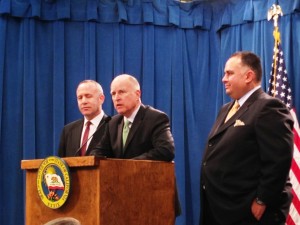Politicians, like college students and journalists, are motivated by deadlines. It often takes the ticking clock of a constitutional deadline or expiring statute for lawmakers to hammer out deals.

This year’s state budget negotiations have been the exception to that rule. Gov. Jerry Brown, Senate President Darrell Steinberg and Assembly Speaker John Perez struck an agreement on a $96 billion spending plan on Monday night. And on Friday afternoon, both the Senate and Assembly approved the budget bill a full 34 hours before Saturday night’s deadline.
It’s the third straight year lawmakers passed a budget on time. This year’s budget process was made easier by three key factors:
- New rules allowing budgets to pass with a majority vote, rather than the two-thirds required up until 2011.
- The broad two-thirds majorities Democrats maintain in both chambers make getting a majority easier.
- A higher-than-expected tax haul, powered by an improving economy and the Proposition 30 tax hikes, means the state currently has a surplus.
While Republicans had applauded Brown’s conservative approach during budget negotiations, no GOP members voted for the spending plan. The budget passed on party line votes in both the Senate and Assembly.
During Friday’s floor debate, Republicans complained they had been excluded from budget talks. “To not even be involved in the process of the budget, to not even know what’s in it, to no one even taking the time to say, ‘Hey, you know what, I’d like to see what you think?’ I have a problem with that,” said Assemblyman Rocky Chavez.